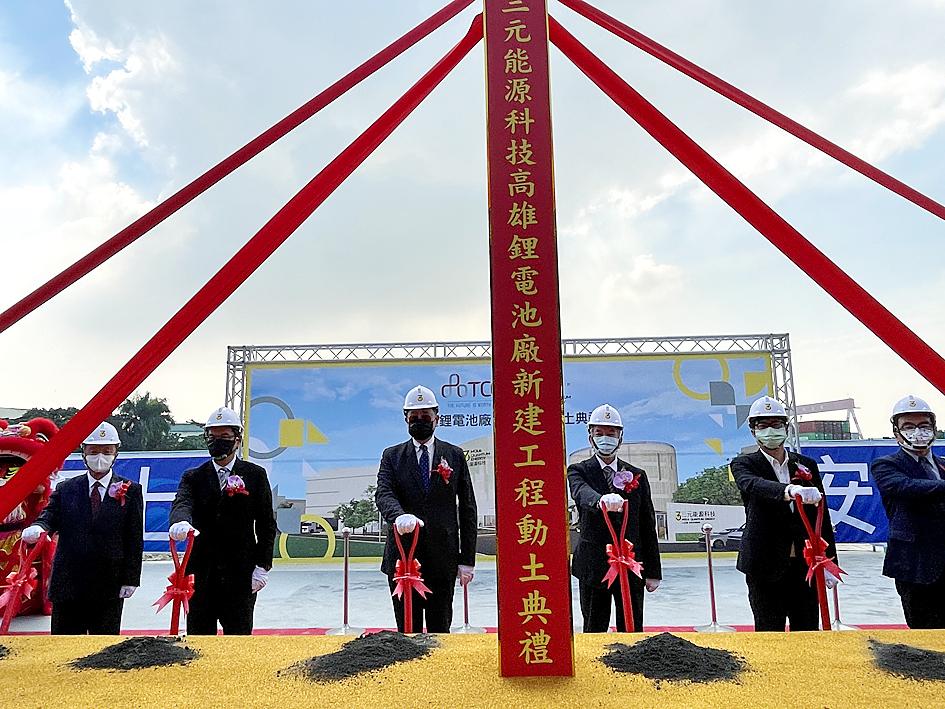Molie Quantum Energy Corp (三元能源科技) is increasing its capital expenditure for a new advanced lithium battery plant in Kaohsiung by NT$6.65 billion (US$237.32 million) to reflect higher investment needs, the subsidiary of Taiwan Cement Corp (台灣水泥) said in a regulatory filing on Friday.
Molie Quantum’s board of directors would raise its planned investment amount to NT$18.65 billion from the initially budgeted of NT$12 billion “due to rising costs and increased equipment purchases,” the filing said.
The new battery factory in Siaogang District (小港) would have a capacity of 1.8 gigawatt-hours and begin operations next year, it said.

Photo: CNA
The estimated capacity is equivalent to supplying the long-range batteries needed for 24,000 electric vehicles per year, the company said in October last year, when it broke ground for the plant.
The firm aims to use nickel, cobalt and manganese to manufacture ternary batteries, and use lithium to make the anode material for the batteries, it said, adding that it is targeting a high-end, customized segment of the electric vehicle market.
The lithium battery market is projected to grow at a compound annual rate of 32.65 percent from last year to 2025, British market research firm Technavio said.
Yuanta Securities Investment Consulting Co (元大投顧) said in a note that the battery business would make a meaningful contribution to Taiwan Cement’s revenue starting this year, when its cement business is expected to be affected by weak demand in China’s real-estate and infrastructure markets amid Beijing’s curbs on the energy sector.
Taiwan Cement’s board of directors on Friday approved an investment of NT$657.3 million to install energy storage systems at a power plant in Hualien County operated by subsidiary Ho-Ping Power Co (和平電廠), the firm said in a separate regulatory filing.
About 20 percent of renewable energy firms need large-scale energy storage equipment to stabilize their supply, Taiwan Cement said.
Because such equipment requires high-quality batteries, supply shortages of such equipment might occur in the near term, the company said.
Taiwan Cement reported net profit of NT$20.26 billion last year, down 20.26 percent from NT$25.1 billion a year earlier, with earnings per share falling from NT$4.32 to NT$3.3, while revenue rose to NT$107.04 billion from NT$105.91 billion, the company said in a statement.

Intel Corp chief executive officer Lip-Bu Tan (陳立武) is expected to meet with Taiwanese suppliers next month in conjunction with the opening of the Computex Taipei trade show, supply chain sources said on Monday. The visit, the first for Tan to Taiwan since assuming his new post last month, would be aimed at enhancing Intel’s ties with suppliers in Taiwan as he attempts to help turn around the struggling US chipmaker, the sources said. Tan is to hold a banquet to celebrate Intel’s 40-year presence in Taiwan before Computex opens on May 20 and invite dozens of Taiwanese suppliers to exchange views

Application-specific integrated circuit designer Faraday Technology Corp (智原) yesterday said that although revenue this quarter would decline 30 percent from last quarter, it retained its full-year forecast of revenue growth of 100 percent. The company attributed the quarterly drop to a slowdown in customers’ production of chips using Faraday’s advanced packaging technology. The company is still confident about its revenue growth this year, given its strong “design-win” — or the projects it won to help customers design their chips, Faraday president Steve Wang (王國雍) told an online earnings conference. “The design-win this year is better than we expected. We believe we will win

Quanta Computer Inc (廣達) chairman Barry Lam (林百里) is expected to share his views about the artificial intelligence (AI) industry’s prospects during his speech at the company’s 37th anniversary ceremony, as AI servers have become a new growth engine for the equipment manufacturing service provider. Lam’s speech is much anticipated, as Quanta has risen as one of the world’s major AI server suppliers. The company reported a 30 percent year-on-year growth in consolidated revenue to NT$1.41 trillion (US$43.35 billion) last year, thanks to fast-growing demand for servers, especially those with AI capabilities. The company told investors in November last year that

Power supply and electronic components maker Delta Electronics Inc (台達電) yesterday said it plans to ship its new 1 megawatt charging systems for electric trucks and buses in the first half of next year at the earliest. The new charging piles, which deliver up to 1 megawatt of charging power, are designed for heavy-duty electric vehicles, and support a maximum current of 1,500 amperes and output of 1,250 volts, Delta said in a news release. “If everything goes smoothly, we could begin shipping those new charging systems as early as in the first half of next year,” a company official said. The new